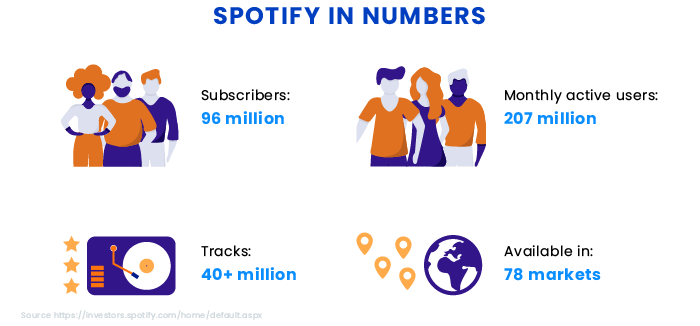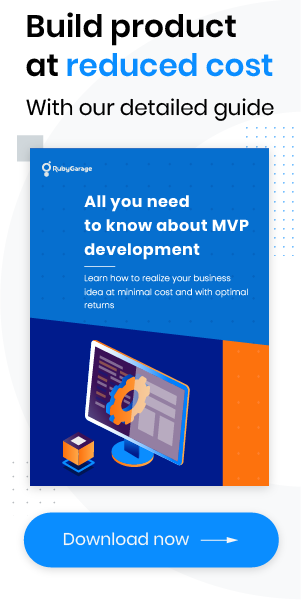-
Product Management
Software Testing
Technology Consulting
-
Multi-Vendor Marketplace
Online StoreCreate an online store with unique design and features at minimal cost using our MarketAge solutionCustom MarketplaceGet a unique, scalable, and cost-effective online marketplace with minimum time to marketTelemedicine SoftwareGet a cost-efficient, HIPAA-compliant telemedicine solution tailored to your facility's requirementsChat AppGet a customizable chat solution to connect users across multiple apps and platformsCustom Booking SystemImprove your business operations and expand to new markets with our appointment booking solutionVideo ConferencingAdjust our video conferencing solution for your business needsFor EnterpriseScale, automate, and improve business processes in your enterprise with our custom software solutionsFor StartupsTurn your startup ideas into viable, value-driven, and commercially successful software solutions -
-
- Case Studies
- Blog
Developing a Music Streaming App Like Spotify: Everything You Need to Know
As technologies have evolved, physical recordings have become a thing of the past. Today, 86 percent of consumers are listening to music using on-demand streaming services.
In this article, we talk about how to create a music streaming app using the example of Spotify. We provide key features, a list of competitors, and a Business Model Canvas for an app like Spotify.
About Spotify
Spotify is a music streaming platform that lets users stream songs of their choice and generates playlists based on a user’s musical preferences.
But Spotify offers more than just access to millions of songs. Its strong point is the community features: On Spotify, users can follow friends and favorite artists and see their listening activity.

Since Spotify isn’t the only on-demand streaming service, we can’t help mentioning some of its competitors. Here is a list of other popular music streaming services and short descriptions of them.
- Apple Music. Apple Music gives users access to 50 million songs and offers a three‑month free trial.
- YouTube Music. YouTube’s music service offers two versions: a free ad-supported version and a premium version. Premium includes background play, ad-free music, and audio-only mode.
- Google Play Music. This service gives users access to 40 million songs. As part of a Google Play Music subscription, users also get YouTube Music Premium.
- Tidal. Tidal is a subscription-based music service that has more than 60 million songs and includes exclusive audio and video content. Tidal provides a 60-day free trial.
- Deezer. Created in France, Deezer has over 50 million tracks. It offers free and premium plans. Deezer Premium has no ads and supports offline mode.
- SoundCloud. SoundCloud users can listen to 175 million songs and upload their own audio content.
Key features for a Spotify-like app
Let’s take a look at the features that an app like Spotify needs.
User accounts. To get started, a user needs to create an account.
Cloud storage. A cloud service enables data storage so that users can access their music files online.
Search. This is a must to let users find songs by artist and title.
Library. This is where users can collect their favorite albums and songs for quick access.
Playlists. Users should be able to create and edit playlists.
Recommendations help to provide a personalized experience. They should be based on a user’s musical preferences.
Offline availability lets users download songs and albums so they can listen to them without an internet connection.
Social sharing. With a sharing feature, users can share playlists with friends through social media.
Notifications. With notifications, users can get news about activity of their friends and favorite artists.
Upload. This is an additional feature that your app needs if you want to let users upload their own content.

How to make money with a Spotify-like app
Spotify gets most of its revenue from ads and Premium subscriptions. In Q4 2018, the company generated almost all of its revenue from subscriptions:
- Revenue from subscriptions accounted for €1,320 million (88 percent of total turnover)
- Revenue from ads accounted for €175 million
Paid subscriptions
Freemium music apps provide some basic features for free, but to get additional features, users need to pay. That’s how Spotify works.
Spotify Premium features include:
- Offline listening
- No ads
- Unlimited skips
- High-quality audio
Paid subscriptions are the main source of revenue for music streaming apps, especially if they don’t provide a free ad-supported option. For instance, Tidal has only paid plans. When the Tidal trial period expires, users have to pay for a subscription.
Ads
To make money with a free music app or plan, you can let brands play ads in your app.
Spotify supports several ad formats:
- Audio. These ads are played between tracks.
- Video. There are several types of video ads on Spotify. For example, with Sponsored Session ads, users are shown video ads that allow them to get 30 minutes of ad-free listening.
- Display. These ads are overlay images that appear when a user returns to the app.
Challenges of creating an app like Spotify
If you’re thinking of creating an app like Spotify, you need to remember that music streaming services face a number of challenges.
Licensing
The first and biggest challenge is licensing. Streaming apps like Spotify are a legal way to listen to music. For every stream, digital music services pay royalties to rights holders. That means that licensing is a must. Otherwise, you’ll violate copyright laws.
A song actually has two copyrights:
- One on the composition itself (the melody and lyrics) that’s owned by the songwriter or publishing company
- One on the sound recording, which is owned by the record label
To stream a song, you need a public performance license. This license is issued by performing rights organizations that collect and distribute royalties for songwriters and publishers. In the USA, these organizations are ASCAP, BMI, and SESAC.
To get a sound recording license, music streaming services sign deals with record labels. To stream indie music, you need to have a deal with Merlin Network, a digital rights agency for independent labels.
Accurate recommendations
Providing recommendations that actually match a user’s musical preferences is vital for a music streaming app. For example, lots of Apple Music users are not satisfied with the app’s recommendations. Considering the competition, users can just switch to other music services.
To provide accurate recommendations, your service needs a strong technology core. Spotify, for example, relies heavily on machine learning algorithms to make the best musical matches.
To provide personalized music recommendations, you first need to collect and analyze data about a user’s musical preferences. You can ask users to choose genres and artists they like right after registration. Lots of music apps do that.
One of the algorithms Spotify uses to make accurate recommendations is called collaborative filtering. This model focuses on finding users with similar musical preferences. Let’s say there are two users, John and Nancy, who mostly listen to similar songs. They both listen to songs A, B, and C. If Nancy likes song D, Spotify will recommend this song to John.

Value proposition
You should clearly communicate the value your app provides to stand out from competitors. That’s why you need a compelling value proposition.
Let’s take Spotify, SoundCloud, and Tidal as examples and look at their value propositions.
One of Spotify’s value propositions lies in the huge number of personalized playlists that it automatically generates, including Release Radar and Discover Weekly. Updated every Friday, Release Radar provides new releases recommended for a particular user. Discover Weekly updates every Monday and is also generated for a particular user based on their musical tastes.
SoundCloud positions itself as not just a music streaming service but also a social media network. SoundCloud lets users upload their own tracks and gives young artists the opportunity to find a community and connect with fans.
To distinguish itself from competitors, Tidal offers high fidelity (Hi-Fi) audio using the FLAC format, which is of higher quality than MP3. As for the value proposition for artists, Tidal claims that it pays a higher ratio of royalties to music creators than any other streaming service.
Entering the market
It’s important to consider the challenge of getting your first users and engaging them with the platform. To address this issue, you need a strong marketing strategy.
Spotify’s marketing strategy includes social media marketing as well as more traditional promotional methods such as TV commercials and billboards. But let’s find out how Spotify started and attracted its first users.
When Spotify launched in some European countries, it was invite-only. Thus, the company could control Spotify’s growth to provide a good user experience. But the invite-only system also helped to create buzz around the launch. Influencers and tech reporters who tested the service shared their experiences, increasing anticipation even more.
In 2001, Spotify partnered with Facebook and launched in the US. The integration let Facebook users show their friends what they listened to on Spotify. This partnership helped Spotify increase the number of Premium subscribers.
Facebook is not the only company Spotify has a partnership with. To attract new customers, Spotify also partnered with Uber, Coca-Cola, and Reebok.
Another music streaming service, Deezer, decided to reach markets where Spotify was not already dominant. Deezer targets listeners in Latin America, Asia, and Africa and focuses on local music genres. As Deezer chief executive Hans-Holger Albrecht notes, while Spotify focuses on playlists, Deezer focuses on local differentiation.
Build an app for web or mobile?
Most digital music services provide web players along with mobile apps. Having a web version can still help you reach a broader audience. It’s always better to let your users choose the device they prefer at the moment.
But if you’re choosing between developing a web or mobile version of your music service, we would recommend a mobile app. And here’s why: According to the Music Consumer Insight Report, 75 percent of consumers primarily use smartphones to listen to music.
In 2015, Spotify provided statistics showing that most of their users preferred mobile devices like smartphones and tablets for listening.

As mobile apps are built for iOS and Android, you can either build a native app for both platforms or choose one platform. Here’s an article where we compare the pros and cons of development for Android and iOS. Check it out if you’re wondering which platform you should choose for your app.
Business Model Canvas for a Spotify-like app
A Business Model Canvas is a template that’s filled with information on a startup’s value proposition, key business partners, resources, revenue streams, etc. It allows you to design and visualize a startup’s business model and quickly evaluate a startup idea.
Startup idea evaluation, in turn, helps business owners make sure their product meets a market need and makes sure the development team can clearly understand the project to formulate requirements.
Here’s a Business Model Canvas for a Spotify-like app:

How to save time and money creating a streaming app like Spotify
The cost of streaming app development depends on many factors, including feature list, an hourly rate of a software development company you choose, and whether the product is going to be developed from scratch. The price can reach $100,000 ‒ $150,000 or even more in some regions for the development from scratch.
If that sounds pricey, don't quit your dream of building a successful startup. Check out a white-label solution for fast and cost-efficient streaming app development developed by our team.
This solution allows us to reduce the cost of such a project to $40,000 for a minimum viable product. What is more, to make your product unique and branded, we can also develop additional features and create custom design of your web app to help your product stand out.










